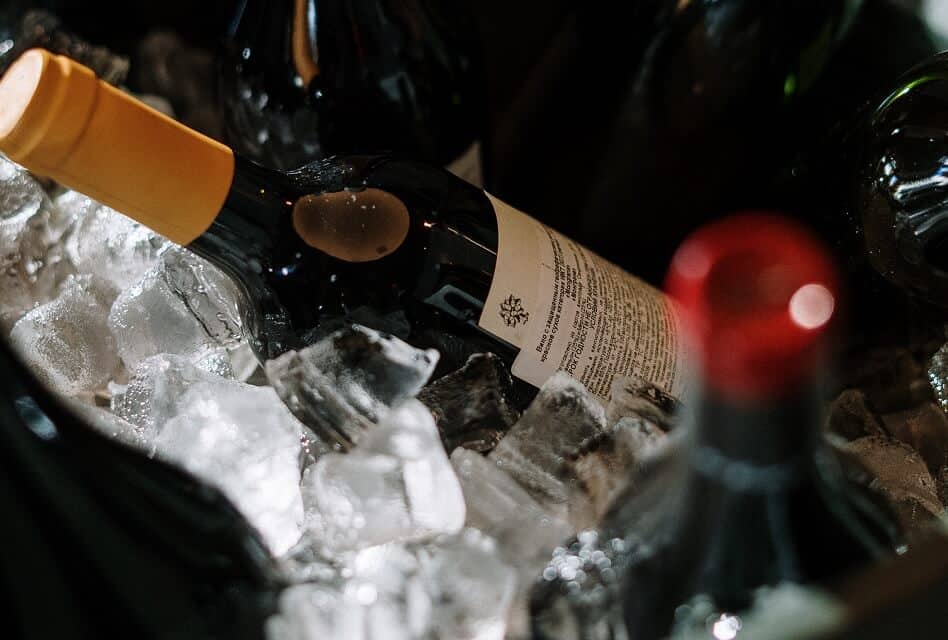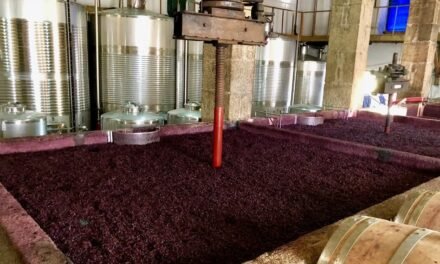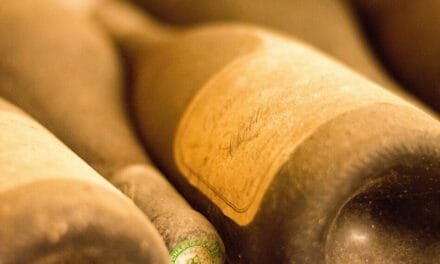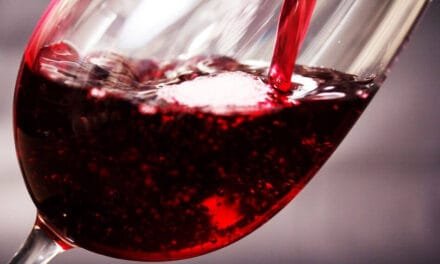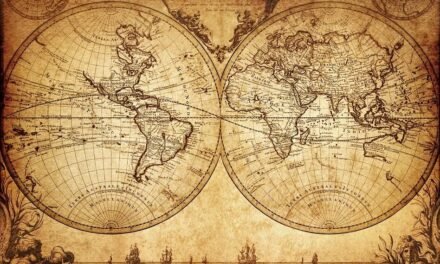Wine is a delicate beverage, and temperature significantly affects its taste. It will taste unbalanced when served too warm, with perceivable alcoholic and bitter aromas. And when it is too cool, some aromas will be muted, leaving the wine dull. But what happens when it gets even colder? Can wine freeze? And if so, how does freezing affect wine?
Wine can freeze when its temperature falls below 25°F (-4°C) for several hours. Freezing can create sediments in wine, and it can change wine’s aromas perceivably. Especially high-quality wines might become unenjoyable as a result.
If you accidentally freeze wine, this does not have to ruin it in every case. This article will discuss the effects of freezing wine in detail, and we will also look at alternative ways to use frozen wine.
DOES FREEZING AFFECT WINE?
Freezing can alter wine’s taste significantly. The reason for this change is that some chemical compounds in wine crystalize when the temperature drops below the freezing point. These compounds are tartaric acids. They contribute to wine color and also stabilize other aroma compounds. So when they crystalize, the wine’s color might change, especially if it is red. Besides, the flavors can change, leaving the wine unbalanced.
In addition to these changes, the crystals create sediment in the wine. This sediment is often visible, giving the wine a murky look. But you can also taste it if the wine is not decanted upfront. So if you make your wine freeze, you might ruin its mouthfeel.
Unfortunately, these changes are irreversible. Even when you thaw the wine, the crystals will not dissolve. Thus, you should avoid freezing wine to preserve its flavors. That is especially true for high-quality wines.
Does Freezing Ruin Wine?
Freezing itself doesn’t necessarily ruin a wine, although it might change its flavors. However, another problem might arise from freezing: leakage.
Just like water, wine expands when it freezes. And while it expands, it might push the cork out of the bottle (or break the screw cap) and cause a leak. Logically, the wine will be exposed to oxygen if that happens, and the oxygen starts additional chemical processes. These processes can result in very sharp new aromas, similar to vinegar or nail polish. And a wine that developed these aromas is definitely not enjoyable anymore.
So freezing wine indeed can ruin it.
Does Freezing Wine Make It Stronger in Alcohol?
Technically, the alcohol level in wine does not change when it freezes. However, if wine freezes only partially, the liquid portion will be higher in alcohol. The reason is the difference in freezing points: For water (which equals wine to some degree), the freezing point is 32°F (0°C), while the freezing point of pure alcohol is -173°F (-144°C).
Can Wine Freeze and Explode?
The chance that a bottle explodes when the wine inside freezes is relatively low. The glass is typically very thick, and there is a weaker point: the cork. If the pressure inside gets too high, the frozen wine typically pushes the cork out instead of making the bottle explode. So even if you make your wine freeze by accident, glass breakage is unlikely.
Can Wine Freeze and Still Be Good?
When frozen for a short time, entry-level wine can be good and enjoyable nevertheless. That is typically only the case if no leak occurs. The only way to know is to try it after thawing it.
AT WHAT TEMPERATURE DOES WINE FREEZE?
The freezing point of wine is between 15 and 25°F (-4 to -9°C), depending on its alcohol content. While water freezes at 32°F (0°C), alcohol freezes at -173°F (-144°C). So logically, higher alcohol contents in wine result in lower freezing temperatures.
Check out the following table to see the exact wine freezing point for different types of wine.
WINE TYPE
ALCOHOL CONTENT
FREEZING POINT FAHRENHEIT
FREEZING POINT CELSIUS
Can Wine Freeze in the Freezer?
It is possible to make wine freeze in a freezer. The recommended temperature inside a freezer is 0°F (-18°C). That is way below wine’s freezing point, which is between 15 and 25°F (-9° to -4°C). Thus, the wine will eventually freeze in the freezer.
However, it is safe to chill wine in the freezer for about 15 to 30 minutes without the risk of freezing it. Beyond that, it will start getting solid. After about 5 hours, it will be completely frozen.
Can Wine Freeze in the Refrigerator?
In a regular refrigerator, wine will not freeze because its temperature is too high. A standard fridge runs at 37 to 40°F (3-5°C). As the freezing point of wine is between 15 and 25°F (-4 to -9°C), it is safe to store wine in a fridge for a couple of days.
Be aware that a regular refrigerator is only an option for short-term storage of opened bottles. Instead, keep sealed bottles in your cellar or a special wine fridge.
Can Wine Freeze in Cold Weather?
In theory, wine can freeze in cold weather. If you leave a bottle outdoors and temperatures drop below 25°F (-4°C) for a couple of hours, it will eventually freeze.
Can Wine Freeze in a Car?
It is possible to make wine freeze by accident if you leave it in a car, given the temperature drops below 25°F (-4°C). It takes a couple of hours until it is frozen, though.
Can Wine Freeze in a Garage?
Wine can freeze in a garage if it is not heated and exposed to very harsh weather. It needs temperatures below 25°F (-4°C) for a significant period to make it freeze, though.
CAN YOU FREEZE WINE TO PRESERVE IT?
Freezing wine to preserve it is not a great idea. As explained, freezing can alter wine’s aromas and lower its quality. If you want to preserve wine, it is better to use a wine preservation system that provides optimal storing conditions without freezing it.
Can You Freeze Mulled Wine?
You can freeze mulled wine without harming it, making it an exception to the rule. Typically, mulled wine is made from entry-level wine, and its flavors primarily come from spices and fruits. Thus, the aroma changes resulting from freezing are insignificant. In summary, mulled wine will be enjoyable, even after freezing, thawing, and reheating.
Can You Freeze Wine for Cooking?
It is possible to freeze wine to conserve it for cooking. When used as an ingredient, slightly altered aromas are not a problem, so frozen wine is fine. However, you should not freeze high-quality wine intentionally, and you should not freeze wine in the original glass bottle. Better use a plastic container.
Can You Freeze Wine in Ice Cube Trays?
You definitely can freeze wine in ice cube trays. Be aware that the wine ice cubes won’t be as delicious as the original wine. So freezing wine in ice cube trays is a way to preserve wine for cooking rather than for drinking it later.

Making Wine Ice Cubes
Can You Freeze Wine to Make Wine Popsicles?
You can make popsicles with wine. You should not make them from wine only, though. Remember that the serving temperature plays a vital role in the wine-drinking experience. When too cold, the delicate aromas are muted, and the wine tastes dull. For frozen wine, that is logically true as well.
So better combine your wine with fruits, juices, wine, or soda when making popsicles. With the right wine popsicle recipes, you can enhance their flavor significantly.
FINAL WORDS
Freezing wine is an annoying accident, but it is not the world’s end. Even if a wine’s flavors have been altered, you can often still drink it or at least use it for cooking. However, as you know that you can freeze wine accidentally or intentionally, you can avoid it and store it safely.

